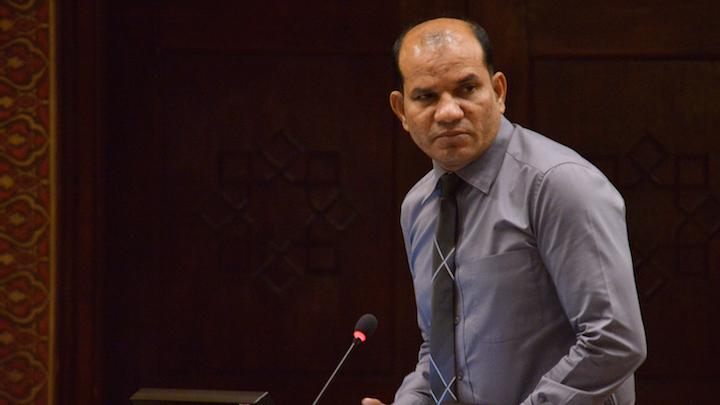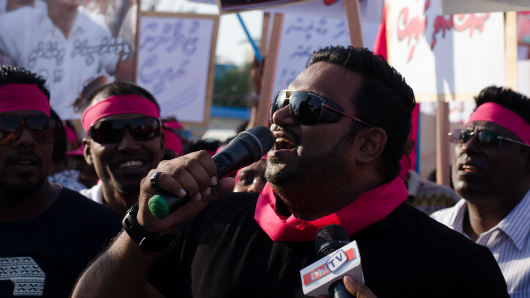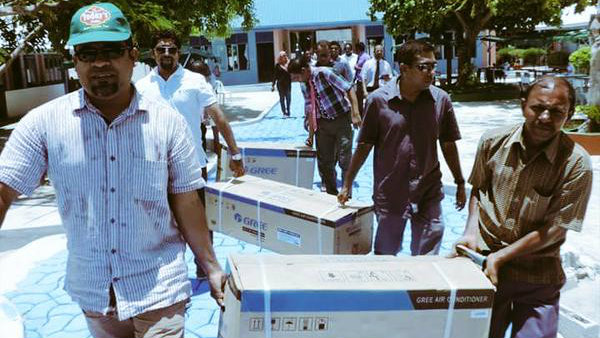Dear Maldives,
I would like to share my story with you guys, to reflect on the prospect of freedom in the Malsdives.
In July 2001, as a student of Humanities at Curtin University in Western Australia, I met, fell in love with and married a Maldivian woman, an ‘overseas student’ from my Political Sciences class.
Due to certain painful complications, although pregnant with my first ever child, the Australian government was threatening to send my wife back to the Maldives.
Preparing myself to live and work in the Maldives to be with my wife and baby, I looked up the Maldives on the net. I wanted to learn something about the ‘culture’ of the Maldives so that I had an idea of how to go about fitting in.
Guess what came up.
The Maldives Culture website and its terrifying tales of a nation run by a murderous dictator who brutally imposed a rigid, mental strait jacket on his people through the control of the religious thought of his people enraged me.
Images of murder and torture imposed on any who dared to think with their own minds, or exercise an ounce of independent thought, religious free thinking or existential creativity caused me to tremble with indignation that a people could be so repressed. I felt this with a particularly fierce intensity seems I have always deeply cherished creative religious thought. My own background involved personal rebellion against the church I had been brought up in, so I was an individualistic oddball even by post-modern western standards, you might say.
Yet, still believing that for love, the sacrifice of self was noble, I decided I would be conformed to whatever I had to be to make sure I could be with my wife and child-to-be. I would allow this Maumoon to control my mind if it meant I was given a visa to be with my family in the Maldives, as it seemed at that stage they had to go back to Maldives. I felt I had no choice.
The next set of complications started when it became difficult to get our marriage registered in the Maldives. Although one particularly kind Maldivian gentleman tried hard to submit our marriage registration papers to Maldivian authorities and get our marriage validated so that I could get a visa, we kept on getting feedback such as, how can I prove my conversion to Islam was not just for marriage purposes? I received letters from the Imam to verify my revert status, certificates, yet the Maldivian Government still was not satisfied that I was genuine.
I began to panic.
I had nightmares of my wife being whipped for adultery and my son being brought up as a half-caste, illegitimate, ostracised nobody in the Maldives, a “bastard’ to use the term in its technical sense. I was told that this was a particularly grave shame in the Maldives. My hatred of Maumoon, who I believed would do this to my family, my fear of him became so intense, that I nearly had a nervous breakdown.
For the sake of my wife’s health, I put on a brave face as though nothing was wrong. When my son was finally born, my wife fell unconscious. I held my newborn baby son in my arms, loving him, so protective. Not knowing if I would keep him or lose him, I clung to him like a desperate madman. In front of everyone, I broke down and wept all over him, I loved him so much; I could not hold my pain inside me any longer. He was so beautiful, and here was I, his Daddy, who loved him so much, yet felt so completely helpless and afraid, so utterly powerless, and the grief was tearing my soul apart.
It took another six difficult years to have this issue resolved. I was in hell, not knowing whether Australian immigration or Maldivian immigration were going to come through. These were years of panic and immense stress. In that time, we had another child, and my interest in Maldivian politics became deep and personal.
The problem became harder when Abdullah Yameen Abdul-Gayoom came to Perth for a week to settle his son into studies. Trying all I could to get things done in the Maldives, I met up with him and tried to patronise him to use him to get some help for me. Sadly, that plan backfired on me viciously.
During these years, I found myself inspired and encouraged by reading about one particularly brave hero, Mohammed ‘Anni’ Nasheed, and the sufferings and the torture he went through fighting a non-violent struggle against this ruthless dictator Maumoon. This Nasheed character was embedded into my imagination as the archetype of courage, freedom, strength, justice, compassion and liberty.
Though I had never met him, he became something like a cult figure to me. I believed that he was suffering so that all oppressed Maldivians could be free. I believed that he was suffering for me. In my confused, anxious, distressed mind, I felt a deep spiritual bond with this guy, although, at that time he would not have known that I even existed.
Just as the endurance, the non-violence and the suffering of Mohammed Nasheed became the hope of oppressed Maldivians, he became my hope as well.
When my issue was finally resolved, I went to the Maldives for three months. The first thing I did was march into the MDP office wishing to offer my support. Anni and a host of other high profile MDP characters were there as there was some important MDP conference coming up. It was about a year before Anni became President. So I met Anni, and the most embarrassing thing happened. All my stress and anger at Maumoon and Yameen flew out of my mouth in that second. I exploded with rage, sadness, I was trembling. Years of pent up pressure, fear, confusion and anger was released onto Anni. I have no doubt he thought I was a total mad man, and he would have been right. Before I could explain myself to him calmly and plainly, I was whisked out of that MDP office as I had a sea plane to catch. Though I tried desperately hard to meet with Anni again to explain myself clearly, it was never meant to be.
Although my hero ‘Anni’ no doubt remembers me as a mad man, to this day, I still revere him for the sacrifices he made to oust a dictator.
This is why it is so hard for me to mentally digest it if it seems that Anni may have been involved in shady deals (bribing MP’s for example) even if they were deals done in desperation to secure the common good of the Maldives. My education and rational mind tells me, Ben, you know what politics is, don’t be so damned naïve. My rational mind is screaming, you know the way that reality works Ben, get the hell over it, power corrupts, and the path to power is corrupt.
My rational mind knows that the MDP is not entirely a bunch of humanitarian martyrs. I know that MDP has the support of both the liberal thinkers and the previously disgruntled businessmen whose motives may not be national interest. Yet my imagination, my creative mind says NO, not Anni, not he, my hero. It hurts me to digest the truth, but, I am a man, so I am digesting the truth, as unsettling as it is. I went through this same painful loss of faith when I left my church, and I am doing it again. I will be less naïve with my comments from now on.
However, if ever I met Anni again, I would like to remind him, that he is still the hope of many Maldivians for freedom and justice.
President Mohammed Anni Nasheed, I would like to remind you, that for many painful years, you were the hope of the freedom of the people of the Maldives. Your people were lead to believe, through Sandhaanu, through the Maldives Culture website, through Dhivehi Observer website and through Minivan Daily and later through Minivan News, that you would free the people of the Maldives from fear.
This includes the freedom from the fear of being used by corrupt politicians, freedom from the fear of gangsters, freedom from the fear of homelessness, freedom from the fear of hunger and want, freedom from the fear of mind control, and freedom from the fear of the loss of freedom of speech.
For the liberties that you have already given, I am deeply grateful, thank you very much. I am appreciative for all that you have done, and I am sure many of your people are as well.
Again, thank you.
But please keep in mind dear President, that many Maldivians still live in a state of fear, and that it seems that when you made the people believe there would be no more fear of the type they experience, you still have a lot of work to do to fulfill what you have allowed people to believe you would do.
It is less painful to have not hoped, than to have hoped and to have been disappointed, dear President. It seems you have been the source of that hope, you will also be targeted as the source of the pain should the people’s hopes remain unfulfilled. I am sure that you are aware of what that means. You will be punished by the electorate, and in how you will go down in memory, if the hopes of the people are betrayed.
So please, from now on, do everything in your power, to realise your people’s hope, dear President. Put all unnecessary things aside; waste no money on non-essentials, and just GO FOR IT!
Despite the recent disappointments, we still believe in you. Our love and our prayers will help you.
Your Sincerely,
Ben Plewright
All letters are the sole view of the author and do not reflect the editorial policy of Minivan News. If you would like to write a letter, please submit it to [email protected]
Likes (1)Dislikes
(1)Dislikes (0)
(0) 


